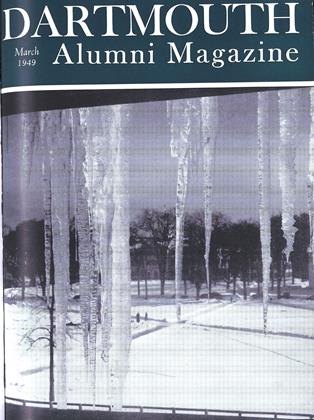Almost since living men remember Dartmouth a lumni and other citizens missed no opportunity to listen to the College's great leaders, Presidents Tucker and Hopkins. They listened because these men had the ability to inspire others.
For about three years John Sloan Dickey, 41, has been sucessor to the tradition of intellectual integrity his predecessors so thoroughly established as head of New Hampshire's great independent liberal arts college. Not until last evening, however, did alumni of this area and others have the privilege of listening to him.
After last evening's talk by President Dickey we got to wondering whether Dartmouth's Presidents help make the College great or the College helps to make them great. At any rate, we have the distinct impression that John Dickey is growing into a third exceptional leader. We say growing because the process is a long one, a never ending one.
As we left the Eagle last evening we heard one of the audience say to another,"Some of that was too damn deep for me." This observation, perhaps repeated by others mentally, if not vocally, is the justification for the preservation of institutions like Dartmouth. It is the justification of the remark made long ago that the price of liberty is eternal vigilance.
President Dickey, like his predecessors, is greatly concerned about academic liberty, and that is what the expression "liberal arts" really means. He places this concern above that which he reports as currently being given first position by all too many in this country, the financial needs of the nation's higher institutions of learning.
At the same time, President Dickey laid down the principle that to get somewhere we must start from somewhere. That is, we must begin with respect for the better existing ways of life, ways to which we owe a degree of loyalty and in the presence of which we must feel some humility. Loyalty to the concept of the family, the community, the nation, or the college—from that beginnning the search for greater truths can proceed with a sense of direction and a base gauge without which progress cannot be measured.
So we must start in this land with the better things: Christian beliefs, democratic convictions, a republican form of government. They are the substance of which the institutions of the family, the community, the nation, and a college are made. From here we seek to progress. As a part of the process of seeking to progress we have the years of formal educational processes, and at an independent liberal arts college the complete effort is to provide perspective, that progress may not be individual achievement only but the unselfish product of society.
Because there are increasingly in this land those who do not understand this, and not understanding, do not progress but retrogress, and threaten the very existence of a society which up to this time has been among the best human aspirations have built, it is vastly important that those who can should speak out as John Dickey did last evening, and that his sort of voice should be generated as it only can be in independent liberal arts colleges, or through the inspiration of the lives of individuals who have maintained their sense of perspective in times when vigilance has been greatly relaxed by all too many.
We think that the voice of liberal leadership becomes more imperative as the peril of its extinction increases. We think that those who are the voice, because they see more clearly our real dangers than do most, are beginning to exert themselves more greatly than since the early days of this republic. We think that there is a quickening response in the hearts and minds of more Americans, who, though individually inarticulate, sense the dangers we all confront, but need the help of those who have the voice to give expression to their feelings.
Even the man who felt that John Dickey was "too damn deep" for him was inspired by what he had heard. He was made a little more uncertain about complacency towards the ways, of danger which have crept among us. That is progress. In time, if the true liberals persist despite themselves, this man again will understand. He will again come to have convictions, good convictions. He will no longer be lost, and ready prey for the unconscionable who roam the earth today in such great numbers.
December 29,1948
 View Full Issue
View Full Issue
More From This Issue
-
 Article
ArticleInternational Communism
March 1949 By SIDNEY HOOK -
 Class Notes
Class Notes1918
March 1949 By ERNEST H. EARLEY, DONALD L. BARR, RICHARD A. HOLTON -
 Class Notes
Class Notes1912
March 1949 By HENRY K. URION, RALPH D. PETTINGELL, EDWARD B. LUITWIELER -
 Class Notes
Class Notes1931
March 1949 By A. W. LAUGHTON, WILLIAM H. SCHULDENFREI, EDWIN F. STUDWELL -
 Class Notes
Class Notes1923
March 1949 By TRUMAN T. METZEL, COLIN C. STEWART III, LEON H. YOUNG JR. -
 Article
Article"The Rewards Are Skill and Enjoyment"
March 1949 By PROF. F. CUDWORTH FLINT
Article
-
 Article
ArticlePUBLICITY FOR THE OUTING CLUB
April 1917 -
 Article
ArticleAlumni Trustee Nominated
December 1934 -
 Article
ArticleQuarterdeck Hop
February 1945 -
 Article
ArticleTHE HANOVER SCENE
October 1959 -
 Article
ArticleGoing Viral
JULY | AUGUST 2015 By —Abigail Drachman-Jones ’03 -
 Article
ArticleBack to Hanover in December
February 1950 By WILLIAM H. HAM '97


